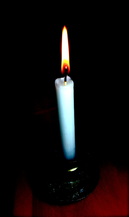
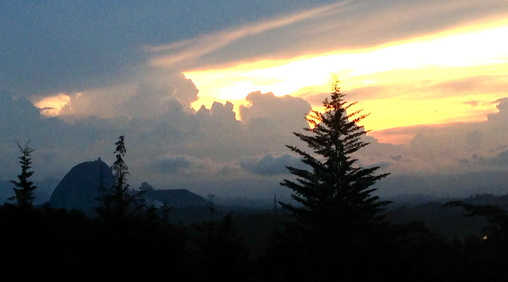
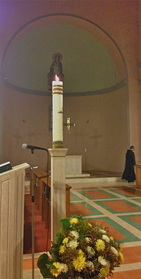
As we stood in line during the lengthy consecration process, images of alternative sacrament-taking ceremonies were flashing through my mind. For example, my experience in the Amazon basin last year where I had the opportunity of participating in traditional Shipibo ceremony. The master Shipibo shaman, Ricardo Amaringo, usually administered the medicinal jungle sacrament to people three or four nights a week. And unlike the dry and plain, boring-colored wafers the Catholic church passes out during their run-of-the-mill Eucharist ceremonies, the Shipibo spend about a quarter of a day diligently preparing and consecrating the liquid, mud-colored glimmers of the drastic psycho-active sacrament they call La Medicina (The Medicine)--or more commonly known as Ayahuasca. The knee-clattering respect and reverence present in each of the people as they stood up and approached the shaman and his sacrament-filled cups of the thickest Ayahuasca in the world shared a similar air to the respect and reverence the monks, nuns and guests displayed while waiting in line to receive the monastery's placebo Eucharist.
Similarly the Amazon jungle-born Christian sect, the Santo Daime, shares an eerily similar religious practice with other typical Christian sects. One of the only differences between the Brazilian-born Santo Daime and other Christian sects, aside from the circular, circuit-board structure-like seating arrangement during their Santa Misa (Holy Mass) and their mandatory all-white dress code, is the fact that when they go up to take the consecrated Eucharist they're not going up to receive non-psychoactive wafers and wine, but instead, they're going up to receive the Daime, their Holy Eucharist--The Ayahuasca. The religious experiences collectively produced by a large group of focused people in this religious setting is so dramatic and filled with tumultuous energy that apparent rips in space and time appear to be ordinary Friday night occurrences. Communicating with star-lit angelic beings, traveling through Hyperspace, witnessing the Source of bright, radiating Light, observing the beginning of the Universe, experiencing the resurrection of Christ and observing reality "as-it-is" are some of the deeper religious experiences that one can undergo during this intense, four-hour Friday night mass.
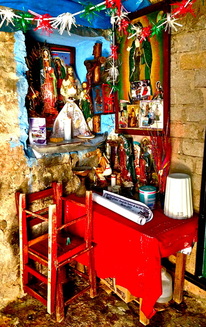
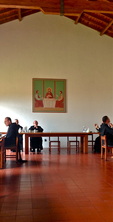
Immediately following this mass is the much anticipated communal lunch. The monks lead the guests to their secretive restaurant-like dining room where we're usually welcomed by majestic classical music. The lunch itself is palatably entertaining. Monks work in the kitchen on a rotating schedule, so it's quite clear that some monks are better in the kitchen than others. Hot lunches come in three course meals paired with pitchers of spring water at every table. Needless to say I was in spring water-drinking heaven. The lucky bastard monks have not one, not two, but three separate springs on their fifty hectares of forested land. So not only do you have the supreme pleasure of drinking liters of forrest spring water every day, but you get to take spring water showers, wash your hands with spring water, drink spring water tea, spring water coffee, eat spring water-containing foods such as soups, beans and rice, brush your teeth with spring water, for shit's sake you're even flushing spring water down the toilet on a daily basis! The monks are truly blessed in that regard.
After lunch we have about an hour to ourselves before a quick lauding at 2 PM. This laud is the quickest of all as it only lasts for fifteen minutes. Then we have a good three-hour chunk of time to walk around the monastery's premise, contemplate, meditate, do some thinking, do some reading and that sort of thing. I really found myself being able to accelerate my understanding of contemplation in the monastery. While reading one of the books I chose from their library I was reminded of the profound concept of contemplation. My understanding of contemplation was originally revised while reading Dostoyevsky's The Brothers Karamazov five or six years ago. I remember reading about the eccentric character, Smerdyakov, and his tendency of suddenly stopping whatever he was doing and just enter into a state of complete contemplatation. Dostoyevsky would go on to poetically describe this deep altered state of mind that Smerdyakov, this eccentric illegitimate son-servant, would frequently and almost epileptically experience. It's a state where no thinking happens, no distraction happens, no day-dreams, night-dreams, planning, futurizing, fantasizing, reminiscing, strategizing, mental games and dialogue--nothing happens. Up until that point in time my semantic interpretation of contemplation was completely twisted. I took it to mean "to think" like many people probably think it means. But I couldn't be more wrong since its meaning is actually the exact opposite. And, so, reading a passage on contemplation in this monk's book I was refreshingly reminded about the true meaning of the word. In fact, reading it in Spanish probably helped to add yet another dimension to my continuing understanding of this universal feeling. It said, more or less, that contemplation is akin to looking at things through the eyes of God. Wow. Think about that one for a minute. What a mystical mission to be accomplished. I'm sure people have experienced random spurts of contemplation—psychedelicized and unpsychedelicized people alike—but how many people have truly sustained an elongated state of contemplation? Now, now, now... Wouldn't it be interesting to put such a Godly state-of-mind into practice?
After all that contemplation we have more lauding at 5 o'clock followed by a brief break and dinner. The dinner would've been excellent except instead of eating in silence or listening to classical music on their state-of-the-art surround sound speaker system, we had the extreme displeasure of listening to an unenthusiastic, monotonous monk boringly talk about God knows what for half an hour. So although the dinner was delicious, the dinnertime was bitter-sweet. This was followed by another brief break and the last nocturnal laud at 8 PM. After the thirty-minute laud we would all retire back to our bedrooms and most likely call it a night, since we all needed to be up by 4 AM for that 4:30 AM laude.
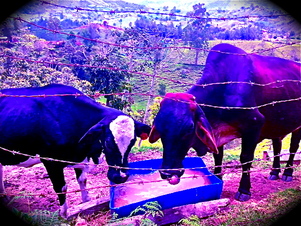
The mushrooms, of course, are due to these goddess cows found by the hundreds in Guatapé. And when the appropriate temperature and rain mix together during the last few months of the year, you get mushroom fields, forever.
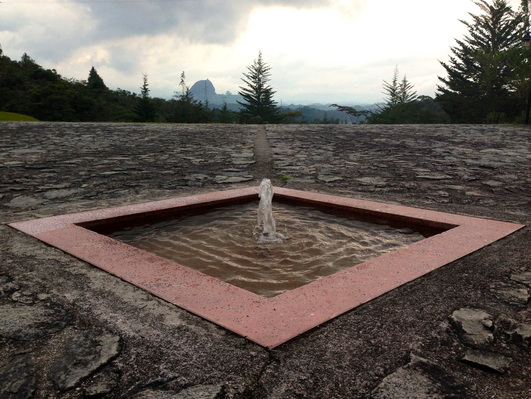
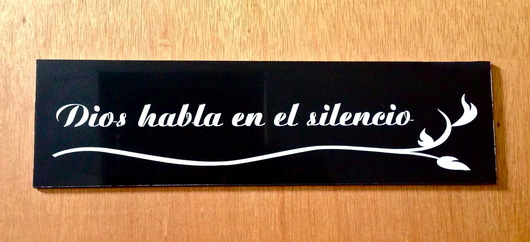
 RSS Feed
RSS Feed
